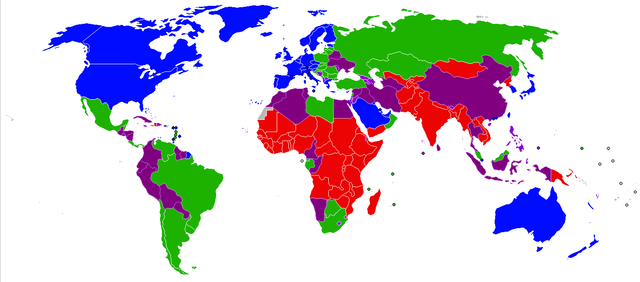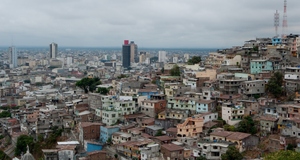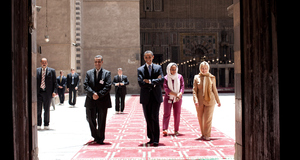From Cornell International Affairs Review VOL. 7 NO. 2Diplomacy and Debt: U.S. Attribution of Status Resulting from IDA Graduation
By
Cornell International Affairs Review 2014, Vol. 7 No. 2 | pg. 1/1
IN THIS ARTICLE
IntroductionFreeman writes that global governance in this period has been characterized by the United States’ inability to form a ‘grand strategy’ as it did in the post-WWII period to cope with the multitude of issues in the world today (2011). He ascribes this failing in part to the militarized approach to foreign policy that developed during the Cold War and stifled other means of American diplomacy (Freeman, 2011). With one fifth of the world’s economy and the world’s only global military force, American diplomacy is critical to the future despite the lack of a ‘grand strategy.’ For example, Henrikson proposes ‘Americanism’ (2006) as one potential future. He does not mean America exerts hegemonic control over the world, but future world diplomacy may become a response to American action and American domestic politics (2006). If the United States’ diplomatic strategy (i.e. attribution of status to states) plays a critical in the world’s future, is it possible to identify trends in status changes? Does financial development play an influential role too? The idea of status that this study propagates throughout its argument derives from the work of Singer and Small (1966), and this study takes its data from the COW Project initiated by the scholars. Singer and Small sought to identify state membership in the international system and to explore the status each state holds in order to better understand the actor and its relationships with others (1966). This definition of status will be used throughout the study:
For the purposes of this study, higher status is theorized to be attributed to a state due to its perceived access to credit. In this case, access to credit would be a perceived strength vice-versa. The scholars argue that a status resulting from such characteristics might be related to a state’s “propensity to become involved in political, economic, or military conflict, … to join in alliances, to interact with nations of higher or lower status, to manifest a conservative or aggressive diplomatic style, and so on” (1966, 238-239). American diplomacy is critical to the future despite the lack of a ‘grand strategy.’ Singer and Small state, “there is that [status] attributed to a given member by most of the community, or more likely, by those members whose own status is high enough to permit them to largely determine the status of others” (1966, 238), and this is the status that the US gives to other states. As Singer and Small suggest, the status that less influential states are able to give on an individual level “may well depend largely upon the peculiarities of the attributer and its relationships to the attributee” and furthermore this status “is also heavily influenced by the multilaterally assigned status” (1966, 238). Singer and Small seem to agree that the status, given by less powerful states, is likely to be dictated by predispositions unique to it or simple replications of the status attributed by more powerful ones. The US has the largest economy in the world. Its investors are very interested in emerging markets, and its banks are highly motivated to seek profit. If a country becomes a good credit risk, then American policymakers have the incentive to recognize its growing power and allow investors to take advantage of the opportunities. It is expected that a sovereign borrower’s increased access to international lending markets is related to other states’ perceptions its government’s status. A lack of access to international lending markets potentially reflects the low status of the borrowing government. The opposite may hold true: increased access may reflect the low status other nations attribute to the borrowing country’s government. In summary, increased access may increase the status of the borrowing state. This study proposes that diplomatic representation is an important outcome of status attribution, or, in Singer and Small’s words, the ‘ill-defined process of reputation-making.’ In the following pages, this paper will explore in more detail how perceived creditworthiness characterizes a state and how it influences the United States’ attribution of status by means of diplomatic relations. TheoryThis study proposes the theory that foreign investors see a country’s increasing ability to utilize international lending markets as a confirmation of its increase in status. As a country gains credit in international markets, corresponding increase in other countries signaling their recognition of the borrower’s sovereignty and international clout would be expected. Dreher et al. explored a similar theory regarding how temporary UN Security Council membership affects the favorable behavior of the IMF (2006). The scholars found that IMF acted more favorably toward a country when they had the influential position of temporary UNSC member, demonstrating that increased power was rewarded by international recognition of that power. Although temporary UNSC membership is not fully equivalent to increased access to lending, each position contributes to an increase in state power. As North and Weingast (1989) and later Shultz and Weingast (2003) make apparent in their analysis of England and other states’ ability to win wars through raising debt, access to credit is a powerful tool. Therefore, the following hypothesis is proposed:
Before the fall of the Soviet Union, the recognition of states was viewed as a political, rather than legal matter (Downer, 2013). Recently there has been a shift toward the legal right to recognition, but political considerations including the desire to resolve conflict, the desire to influence the policy of new states, the desire to control territorial claims, and the consideration of alliances have remained pertinent (Warbrick, 1992). Political considerations in US diplomacy in particular have reflected those of American domestic politics. Wiseman asserts that the “US Congress is relatively more influential and actively involved in US foreign policy and diplomacy than are comparable legislatures in the Western world” (2011, 242). In acknowledgment of the previously mentioned political considerations that may influence the decision to attribute status to states in addition to financial development, the following null hypothesis is proposed:
By means of these two proxy variables IDA graduation and diplomatic representation, therefore, this study will analyze the relationship between access to credit and the United States’ attribution of status. Research MethodsTo demonstrate whether a country’s increased access to credit in international lending markets influences the US’s perception of that country’s status, a series of graphs illustrating the relationship between proxy variables are presented. If the hypothesis is correct, these graphs should show that diplomatic representation increases after IDA graduation. The year that states graduated from the International Development Association (IDA) serves as the independent variable, access to international lending markets.2 Diplomatic representation serves as the dependent variable, American recognition of status.3 It is necessary to explain the reason for using IDA graduation years to represent access to international lending. The International Development Association (IDA) is a World Bank program that lends money and provides grants to the world’s poorest countries on concessional terms. With the intention of fostering economic growth and improving basic living conditions within these countries, the IDA lends with little or no interest rates and repayment is a decadelong process with a considerable grace period. When the IDA’s borrowers reach a particular point of economic growth, they graduate from the IDA program and become eligible for loans from the International Bank for Reconstruction and Development (IBRD). Graduation from the IDA signals to the world that a country is a reasonable credit risk. Because the IBRD is a self-sufficient business, its demonstration of trust in a poor country encourages other investors to also lend to the country (“International Development Association: The World Bank’s Fund for the Poorest” 2012). Moving up the ladder from the IDA to the IBRD signals to the international community that the state is gaining status in the world. The desire... to influence the policy of new states... to control territorial claims, and the consideration of alliances have remained pertinent. The sample includes all countries that have graduated from the program since its formation in 1960.4 States that graduated from the IDA and then reverted to IDA status as their economic conditions retrogressed are also included in order to determine if the attribution of status might be taken away as easily as it is attributed. Adding these particular IDA graduates provide an interesting opportunity to observe the influence of the differentiating characteristics on the dependent variable. In the graphs, the dependent variable IDA graduation is represented by the values of 0 and 1. The value 0 signifies that the country was not graduated in that year. The value 1 signifies that the country was graduated in that year. Diplomatic representation was chosen to quantify the American government’s perception of status due to its symbolic value. Diplomats have long been used to represent the interests of the state abroad. When a state initiates a diplomatic exchange with another or increases the rank of the diplomat in residence, it signifies that the two states have a mutual interest in cultivating their relationship. Data provided by world bank on income groups, among which 82 countries are eligible for borrowing under the ida program due to their relative poverty. This study considers the attribution of status given by United States through diplomatic representation rather than the attribution of status by the international community as a whole in order to increase our understanding of America’s diplomatic objectives. An analysis of the relationship between IDA graduation and the international community’s diplomatic recognition would be valuable; however, this study takes a more narrow approach. The United States possesses a distinct position in international affairs, and therefore merits a distinct analysis of its diplomatic behavior, especially now in this period of globalization and diffusion of power in the world system.5 Although the COW database was instrumental in the research of this study, its data availability was also limiting. The most recent diplomatic representation data was from 2005. Several countries that had received IDA loans or grants graduated in 2006, so this data restriction prohibits a full analysis of these cases.6 Within the database, note that the diplomatic variable is represented by five different codes. A coding of 0 signifies that there was no evidence of diplomatic exchange. A coding of 1 signifies a chargé d’affaires was in residence, or that the diplomatic delegation was expelled, recalled, or withdrawn. A coding of 2 represents a minister. A coding of 3 represents an ambassador. A coding of 9 was used when there was evidence of diplomatic exchange, but not enough evidence to tell what that exchange consisted of. In the graphic representations of this data, the IDA graduate country’s GDP has also been included. Any trends in the graduate’s GDP would illustrate whether a diplomatic change was the result of a sudden economic event, i.e. the IDA graduation, or if it was the result of steady economic growth over a period of time. AnalysisThe list of IDA graduates contained thirty six cases. Of these thirty six cases, eight reentered the program and have not graduated again as of yet. The analysis was performed on all thirty six cases because all the countries had graduated once, which was a sufficient manifestation of the independent variable. Graphs are chosen for this analysis because they are capable of demonstrating trends and suggesting what is and is not occurring in the sample. With a convincing consistency across the sample the graphs suggest that higher status attribution in the eyes of the United States is not strongly related to increased access to international lending. It is more likely that the attribution of higher status is positively correlated to general economic growth. For some cases, diplomatic relations were stable throughout the observation period. These countries had several predictable attributes. Some, like China and Turkey, were states so important to US interests, mainly in trade, that diplomatic ties had been established long ago (1832 was the earliest recorded diplomatic exchange for Turkey, and 1864 was the earliest exchange for China) and had been faithfully maintained. Some, like Costa Rica, Colombia, Chile, Honduras, etc., were geographically close to the US and had been subject to US imperialism for decades. Therefore it is expected for diplomatic relations to have already been established inthese countries. Research seems to suggest that the US no longer considers poor states gaining increased credit access through IDA graduation to be a noteworthy event. There were some cases where diplomatic relations were dynamic during the period under observation. The diplomatic exchange between the US and states such as Botswana, Serbia, and Macedonia, has improved over the period of observation. This increase in status given to these countries appeared to be correlated to the IDA graduation, but could also have been a result of general economic growth. Although some cases appeared to support the theory, others seemed to refute it. In some cases, like Equatorial Guinea, diplomatic relations decreased although the country graduated from the IDA and economic conditions appeared to be improving. The cases of Ecuador, the Dominican Republic, and El Salvador similarly confounded the theory. In these situations, it appeared that other, unrelated factors were playing an important role in the changing diplomatic relationships. It was very surprising that the countries with the most unstable relationships with the IDA— graduating and reverting multiple times—had some of the most stable diplomatic ties with the US. Indonesia, Egypt, and Honduras were such countries where this phenomenon occurred, and their experiences seem to thoroughly oppose the theory. In each of the three countries, GDP was relatively steadily increasing, which seems to suggest that GDP, not IDA graduation rates, was driving the diplomatic exchanges. Other cases seemed to both support and refute the theory. For example, the graduation of the Republic of the Congo from the IDA seemed to have a strong positive correlation to increasing diplomatic ties with the US. However, when the Congo relapsed and returned to the IDA several years later, diplomatic ties remained constant. Perhaps this is a demonstration of Newton’s Law—a state with diplomatic ties to another state tends to maintain diplomatic ties with that state unless some force is applied. The Congo’s return to the IDA was obviously not a strong enough force to dissolve diplomatic ties with the US. Although the cases show substantial variation in the relationship between IDA graduation and diplomatic exchanges, there is not sufficient evidence to reject the null in favor of the main hypothesis. The US may reward a state that has acquired a perceived increase in power with an increased status in the community, but it appears that the US does not view IDA graduation and the associated access to credit as a significant increase in power. It seems more likely that other characteristics of the states are perceived as increased-status-worthy. The characteristics that the graphs highlight as correlated to increased status include economic growth, geographic proximity (on an individual state level), importance to trade, and resource wealth. ConclusionsThis research has obvious limitations and weaknesses. Graphs are not as reliable as regressions and other more advance statistical analysis when identifying trends in the data, but the data limited the types of analyses possible. The relationships this study was able to propose were tenuous and need additional confirmation. The availability of data was another significant issue. The sample size was not large enough, and it was limited further by the five year gaps between diplomatic data, lack of current diplomatic data, and lack of older GDP data, the number of conclusions a researcher would be able to draw were limited. Despite limitations it should not be assumed that the research was unsuccessful. To the contrary, research seems to suggest US no longer consider poor states gaining increased credit access through IDA graduation to be a noteworthy event. This research demonstrates that the United States instead takes into account a variety of different factors when attributing higher status to states. It is significant that many of the relevant factors are related to economics; this shows that while the United States may not be responding directly to IDA graduation, financial development does play a role in increased status in the American perspective. Opportunities for further research are numerous. It would be very interesting and useful to perform the same study using a more advanced statistical analysis unlimited by data concerns. This would demonstrate with more certainty the correlations between access to credit and increased international status. Another opportunity for study concerns further relationships between diplomatic exchanges and financial growth. Of all the factors motivating diplomatic relationships and the changes within, how large of a factor is financial development? This research would not need to be limited to a study of IDA graduates. It would be extremely interesting to perform case studies of the most enduring diplomatic relationships in the international community, and to attempt to determine in which ways financial factors have strengthened or weakened those relationships over time. Although IDA graduation does not appear to have a large impact, it is very possible that other financial factors do. Endnotes
Suggested Reading from Inquiries Journal
Inquiries Journal provides undergraduate and graduate students around the world a platform for the wide dissemination of academic work over a range of core disciplines. Representing the work of students from hundreds of institutions around the globe, Inquiries Journal's large database of academic articles is completely free. Learn more | Blog | Submit Latest in International Affairs |




















